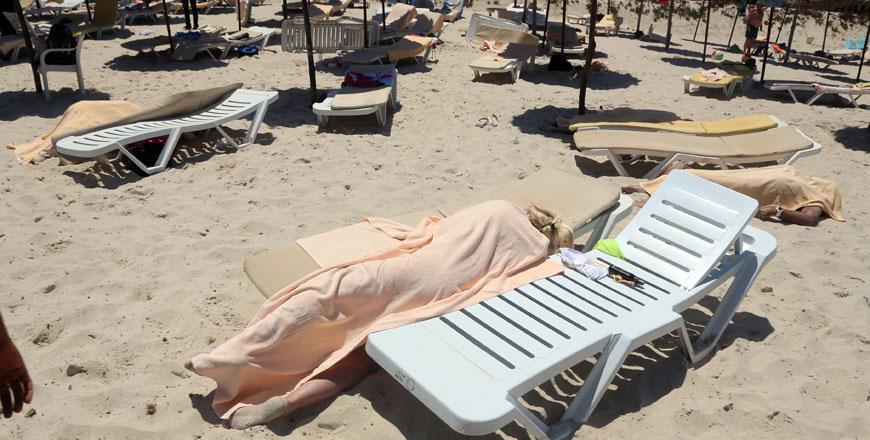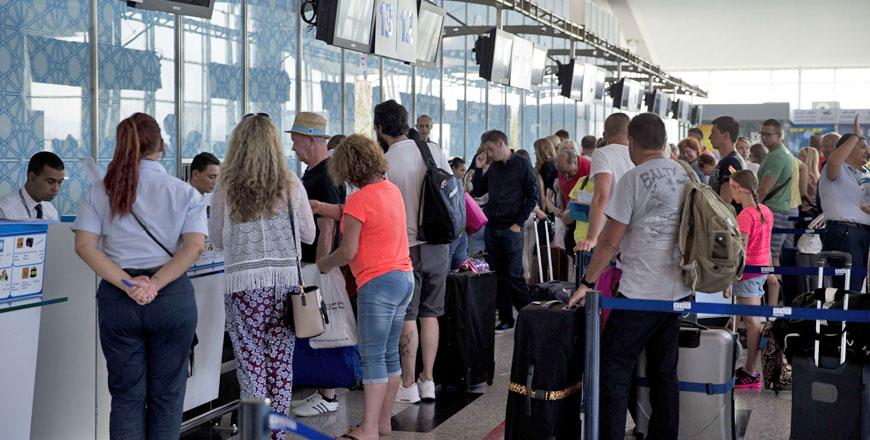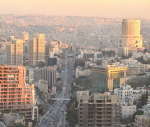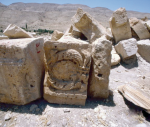You are here
Kuwait arrests suspects in mosque attack, mourns dead
By Agencies - Jun 27,2015 - Last updated at Jun 27,2015
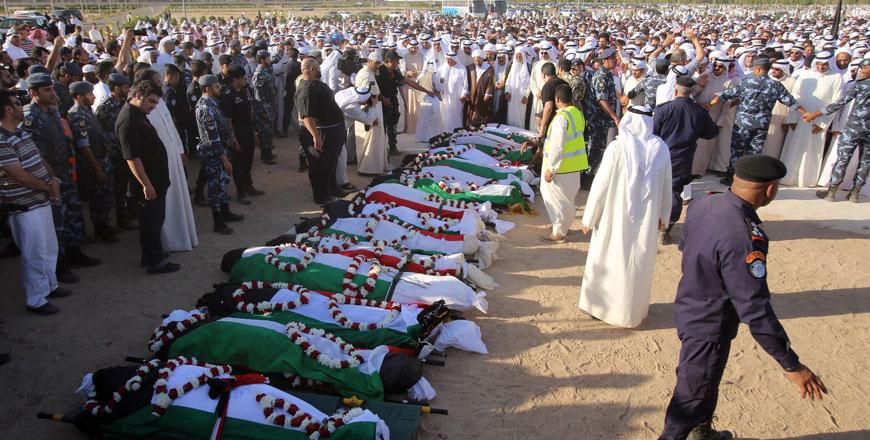
Mourners pray over the bodies of the victims of the Imam Al Sadeq Mosque bombing during a mass funeral at Jaafari cemetery in Kuwait City on Saturday (AFP photo)
Kuwait detained the owner of a car that took a bomber to a Shiite mosque to carry out the country's worst ever militant attack, officials said on Saturday, as thousands calling for national unity turned out to bury some of the 27 killed, Reuters reported.
The Daesh terror group claimed responsibility for the suicide bombing against 2,000 worshippers praying at the Imam Al Sadeq Mosque on Friday, one of three attacks on three continents that day apparently linked to hardline Islamists.
In Tunisia, a gunman killed 38 people including Western tourists on a beach, and in France a decapitated body was found after an attacker rammed his car into a gas container, triggering an explosion.
Officials said the bombing was clearly meant to stir enmity between majority Sunnis and minority Shiites and harm the comparatively harmonious ties between the sects in Kuwait.
In a statement, the information ministry said Kuwait would face the situation with "unity and solidarity". It reiterated what it called the government's strong stance on the freedom of religion and opinion, noting these were rights protected by the constitution.
The interior ministry, which reported the vehicle owner’s arrest, said it was now looking for the driver who vanished shortly after Friday’s blast in Kuwait, which has been spared the rampant violence of neighbouring Iraq and the recent spate of Daesh bombings of Shiite mosques in Saudi Arabia, another neighbour.
A security source told Reuters “numerous arrests” had been made in connection with Friday’s bombing.
At the burial site in the Sulaibikhat district, some waved Kuwaiti flags while others bore the large mourning banners, in red, black or green, that are typical of Shiite funerals.
Chants from the crowd included “Brothers of Sunni and Shia, we will not sell out our country”, “No Sunni, no Shia, we are one Islam”, “The martyrs are the beloved of God” and “Down with Daesh! Down with Daesh”.
One group of mourners said they had travelled from Qatif in Saudi Arabia where 21 people were killed by a Daesh suicide bombing in May.
Two Iranian nationals were among those killed, foreign ministry spokeswoman Marzieh Afkham was quoted as saying by Iranian state media on Saturday.
Relatives of seven of those killed wept and prayed over their shrouded corpses at a mosque on Saturday, where they were waiting to be taken to the Shiite holy cities of Najaf and Karbala in Iraq for burial.
“We will cut the evil hand that interferes with our homeland’s security,” Interior Minister Sheikh Mohammed Al Khaled Al Sabah was quoted as saying by state news agency KUNA.
Kuwait has stepped up security to the highest level at state-run oil conglomerate Kuwait Petroleum Corp (KPC) and its affiliates, KUNA also reported.
Daesh named the bomber as Abu Suleiman Al Muwahed and said on social media that he had targeted a “temple of the apostates” — a term the group uses to refer to Shiites, whom it regards as heretics. It did provide details of his nationality.
Daesh had urged its followers on Tuesday to step up attacks during the Ramadan fasting month against Christians, Shiites and Sunni Muslims fighting with a US-led coalition against the ultra-hardline jihadist group.
Tunisia steps up security
Tunisia’s prime minister announced on Saturday a string of new security measures including closing renegade mosques and calling up army reservists as thousands of tourists left the North African country in wake of its worst terrorist attack ever, according to the Associated Press.
Tourists crowded into the airport at Hammamet near the coastal city of Sousse where a young man dressed in shorts on Friday pulled an assault rifle out of his beach umbrella and killed 38 people, mostly tourists — many of whom were tourists.
“The fight against terrorism is a national responsibility,” visibly exhausted Prime Minister Habib Essid said at a news conference in Tunis. “We are at war against terrorism which represents a serious danger to national unity during this delicate period that the nation is going through.”
Essid announced the call-up of army reservists and said they would be deployed in tourist sites around the country and inside hotels, while he called on the hotels themselves to do more to enforce security.
He also said that political parties and associations espousing radical ideas with suspicious funding would be closed down and around 80 mosques known for extremist preaching would be shut.
The government has been criticised for its lackluster anti-terror measures, especially since 22 people were killed by gunmen at the national museum in March. There was also been a failed suicide bomb attack in Sousse in 2013.
Top security official Rafik Chelli said Friday that heightened security measures had been in place for the summer season around the hotel and security had responded quickly to the attack.
“The attack is an isolated operation of the sort that could affect anyone,” he said, noting that just days earlier two other planned attacks had been thwarted.
The attacker, who was killed by security forces, was identified as Seifeddine Rezgui, a young student at Kairouan University. A tweet from Daesh claimed responsibility for the attack and gave his jihadi pseudonym of Abu Yahya Al Qayrawani, according to the SITE intelligence group.
Attack in France
In France authorities are questioning a 35-year-old delivery man of North African origin over a suspected Islamist attack involving the beheading of his boss and an attempt to blow up a US-owned chemicals plant in southeastern France, according to Reuters.
President Francois Hollande, dealing with new security fears less than six months after 17 people were killed by Islamist gunmen at satirical weekly Charlie Hebdo and a Jewish foodstore in Paris, said the incident clearly amounted to a terrorist attack.
Yassim Salhi is suspected of having rammed his delivery van into a warehouse of gas containers, triggering an initial explosion. He was arrested minutes later while opening canisters containing flammable chemicals, prosecutors said on Friday
Police later found the head of the 54-year-old manager of the transport firm that employed the suspect, dangling from a fence at the site, framed by flags with written references to Islam.
Salhi is being held in Lyon, where he was refusing to respond to interrogators on Saturday, according to a law-enforcement source. His wife, sister and a fourth person are also in detention.
Salhi is known to have associated with Islamists over more than a decade and had previously been flagged by French authorities as a potential risk, but there has been no claim of responsibility for the attack.
While an anti-terrorist inquiry has been launched, Paris public prosecutor Francois Molins said it would be premature to make any conclusions at this stage and investigators had yet to fully understand what happened at the industrial zone in Saint Quentin-Fallavier, 30km south of the city of Lyon.
“Questions remain over the exact chronology of events, what happened when he arrived, the circumstances of the decapitation, the motivation and whether there were accomplices,” he said.
There was no evidence Friday’s three attacks were deliberately coordinated. But coming so close together, they underscored the far-reaching, fast-growing influence of Daesh, Western politicians said, according to Reuters.
Related Articles
KUWAIT — Kuwait’s interior minister said on Tuesday the Gulf Arab country was at war with Islamist militants and would strike out at cells b
Port el Kantaoui, Tunisia — Planeloads of shocked foreign tourists flew home from Tunisia Saturday after a beachside massacre claimed by the
PORT EL KANTAOUI, Tunisia — Tunisia said Sunday it would deploy hundreds of armed police around tourist sites as authorities moved to ramp u


